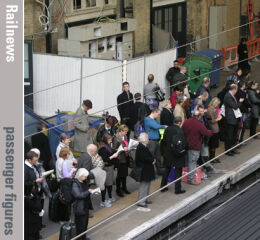Posted 25th August 2022 | 4 Comments
National Rail passenger numbers recover further

The number of passengers on National Rail reached 95 per cent of the pre-Covid level on one day earlier this month, and figures on other days were also above 90 per cent, according to the Department for Transport.
The latest official statistics show that the peak was reached on 10 August, when it was 95 per cent. It was 94 per cent on 7, 8 and 11 August.
The totals eased back to 88 per cent on Saturday 13 August, when there was a National Rail strike, and 82 per cent on Monday 15 August, when fewer people would have been travelling to work because of the summer holidays.
These are the most recent figures available.
The Railway Industry Association has urged the government to take the recovery into account when planning railway investment.
RIA chief executive Darren Caplan said: ‘Given all the industrial action of recent weeks, and that the month of August is the traditional summer season when many go on holiday, it is astonishing that we are now getting 95 per cent of pre-Covid passenger levels reached on the national rail network, and in a week where over 93 per cent was recorded every single day of the week. This welcome milestone has been hit less than six months since pandemic restrictions started being relaxed, and is a clear vote of confidence in UK rail.
‘One must assume it is only a matter of time before we are back to 100 per cent of pre-Covid levels. Given this, RIA and our members once again urge the Treasury and policy-makers and influencers not to base 30-year programmes and forecasts for the future of rail on the abnormal period of the pandemic, but instead to plan increased investment for the growth in capacity we are going to need in the years ahead.’
Reader Comments:
Views expressed in submitted comments are that of the author, and not necessarily shared by Railnews.

R Clayton, HULL
Passenger numbers don't pay the bills revenue does and leisure travel brings in far less. What is the current revenue figure verse pre-Covid?
[The ORR says passenger revenue was £5.9 billion in the year to 31 March. The previous year it was £2 billion. The latest figure to March was 54% of the pre-Covid total. However, a couple of qualifications. First, revenue is turnover, not profit. Secondly, the more recent figures show sharp increases in usage since April. Commuter services are exceptionally expensive to provide, but trains carrying leisure traffic earn money all day. I do suggest that it is much too soon to draw long-term conclusions based on previous figures. The railway would be better, not worse off, without such sharp peaks, but the adjustment will take time.--Ed.]
Chris Jones-Bridger, Buckley
As a postscript the announcement of ever escalating energy costs means working from home may not be such an attractive proposition afterall. That warm office, heated at an employer's expence, may remain an attractive proposition. With so many variables affecting demand perhaps it is a little premature to write off the commuter market.
Christopher Jones-Bridger, Buckley Flintshire
Let's take encouragement that passenger demand is bouncing back. The pandemic should be seen for what it is, a once in a century aberration, and not an excuse for knee jerk decision making. What matters in policy making is long term trends & until the evidence of how the economy has recovered is fully understood decision makers should be careful of undermining the industry's future by rash decisions now.
Passenger volume suggests that confidence in public transport is recovering. However the distribution in demand between commuting, business & leisure will have a profound impact on revenue. Also as the editior corectly points out a flattening of the peaks can make a significant difference to the cost base. Perhaps though a word of caution. The south east commuter market has previously seen fall off's in demand, usually correlating to the cyclical pattern of the economy, but the longer term trend has been growth. Pre covid franchises were being let on the assumption of rising demand & investment in additional capacity was being provided. While working from home is having an impact on commuting I think it is probably a little premature, based on past experience, to say that the long term trend will not still be growth albeit with the proviso that the weekend may be extended. This suggests the traditional season ticket may have seen it's day & calls for innovation in ticketing to manage both manage peak demand & encourage leisure use on non work days.
Jez Milton, Manchester
LOL! So leisure passengers having to displace their date of travel is somehow "good news". Of course the days leading up to, and after, one day strikes will be busier! What percentage of 2019 "weekday peak" commuting has been permanently lost? 40%....
[I have said this before, but I will repeat: commuter business is not worth having if it needs extra resources which are only used three or four hours a day. It is known as The Problem of the Peaks and bedevils transport systems worldwide -- especially railways because of their fixed infrastructure. The railways would be better off without sharp peaks -- and 40 per cent is a good start. Crocodile tears are not needed. On the other hand, buoyant leisure traffic is the way forward, and it is evidently doing well.--Ed.]